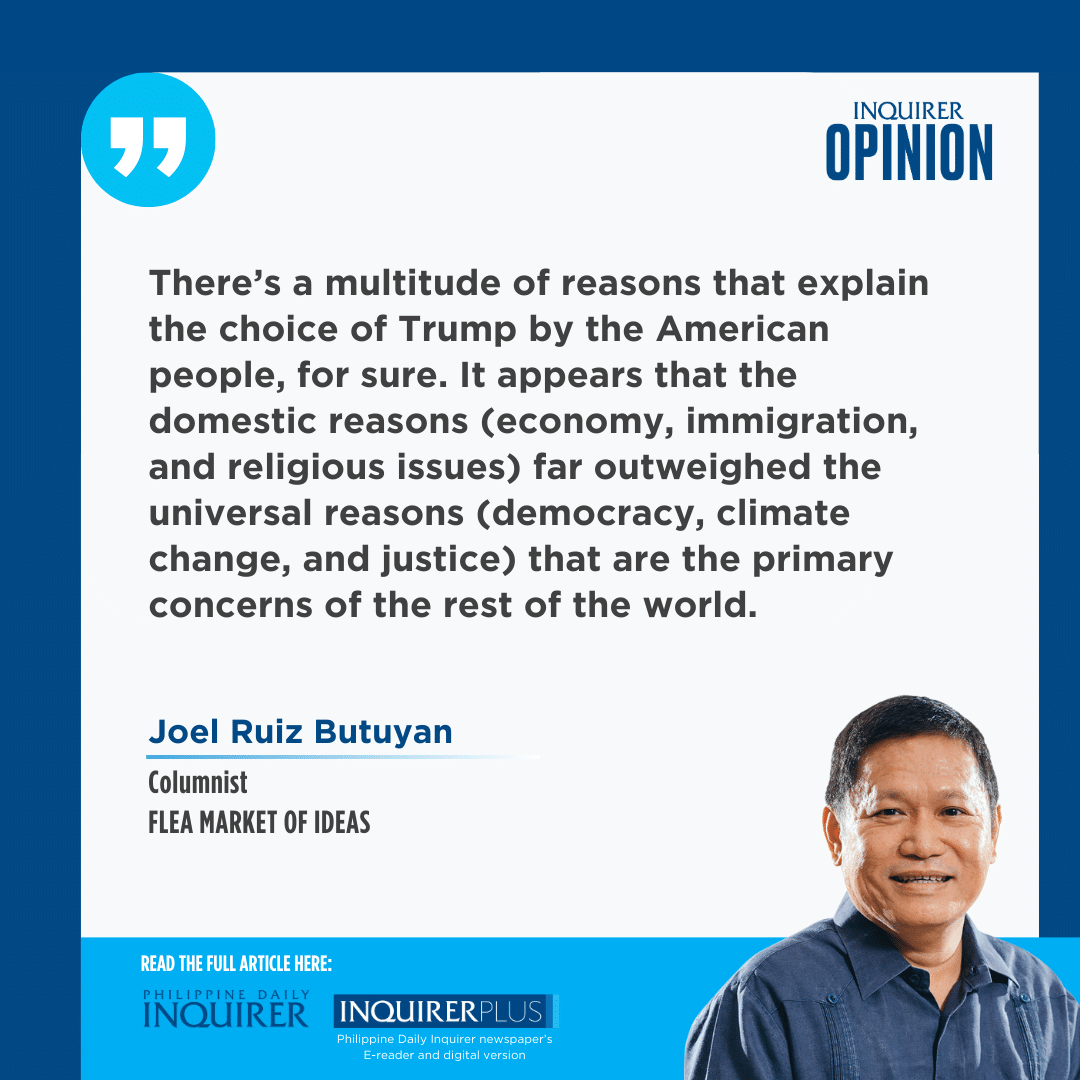
In a stunning victory, Donald Trump recaptured the most powerful post on earth, the United States presidency, despite his criminal convictions, scandals, and his open display of undemocratic ways.
Trump’s electoral triumph is astonishing for so many reasons. He did so with a sizeable support from conservative religious groups. He won by increasing his support among women and racial minorities compared to the previous elections. And he prevailed in the country considered as the world’s leader of democracy.
His support from religious conservatives is attributed to his positions that are viewed as anti-abortion and anti-LGBTQ rights. However, his abortion stand has swung from anti-abortion to leave-it-to-the-states-to-decide standpoints. On the other hand, his opinion on LGBTQ rights has vacillated from pro to anti throughout his adult life. It makes one wonder if the positions he has taken on these issues during the election period were really animated by principles and earnest beliefs rather than dictated purely by election aspirations.
During the election campaign period, I saw a clear divide on opinion about Trump in my circle of friends and relatives of Filipino descent. A majority of those based in the US are Trump supporters. In contrast, an overwhelming majority of Filipinos in the Philippines are against Trump. I suspect that if the votes of “brown Americans” were counted from the land that pretends to be the 51st state of the American union (i.e., the Philippines), the US election results would have been different.
What explains the divide? Do Filipino Americans view Trump as better for the US, while Filipino outsiders view the new President-elect as bad for the world? Do Filipino Americans get their information overwhelmingly from media supportive of Trump, while Filipino outsiders are fed with news from traditional media sources which are viewed as anti-Trump?
There’s a multitude of reasons that explain the choice of Trump by the American people, for sure. It appears that the domestic reasons (economy, immigration, and religious issues) far outweighed the universal reasons (democracy, climate change, and justice) that are the primary concerns of the rest of the world.
As observed by many, what happened in the US follows the trend in so many other fairly democratic countries that have lately been leaning in favor of leaders known for their antidemocratic ways. Is democracy being rejected worldwide in favor of authoritarian rulers? There can never be doubt that people will choose democratic leaders over autocratic ones, everything else being equal. Who would want to surrender civil and political rights (freedom of expression, freedom against arbitrary arrest and search, etc.) and freely choose to be under an oppressive government? Just look at the people under dictatorial regimes and their uniform yearning and struggles to attain the rights enjoyed by people in politically free countries.
What is being rejected by citizens in democratic countries, is the kind of economic system that has piggybacked on or has been partnered with political democracy. Equality between the rich and the poor in the exercise of political rights is the correct postulate in these free countries. However, equality of economic rights of the rich and poor alike is disastrously a wrong societal premise. Equality in economic rights, indiscriminately applied, is a mirage. It has fostered a society where the rich are getting richer while the poor have remained poor. What is being rejected is an economic system which gives the poor a very slim chance of moving up the economic ladder because access to quality education, good health services, suitable nutrition, and efficient public services are based on one’s ability to pay.
Trump will be committing a tragic mistake if he thinks that he has been given the license to trample upon civil and political rights because the marching orders given to him is to fix the economic system that’s fostering inequality and hopelessness in a politically democratic country like the US.
With regard to issues like abortion, LGBTQ rights, and immigration, societal opinion is in a flux. These issues are still being stewed in the cauldron of civilization. While conflicting attitudes on these matters are still being debated upon, the belief of one segment of society should not be imposed on other sectors with contrary views through means that are repressive and inhumane. Enlisting the rule of dictatorial or fascist leaders to impose one view against other views will prolong a society’s sojourn in the wilderness.
The complexity of human affairs and the diversity of our pursuits have led every individual to be endowed with divergent beliefs. Whatever fundamental differences that we have, we should possess, enjoy, and assert our convictions under a political atmosphere that fosters free and healthy debate.
—————-
Comments to fleamarketofideas@gmail.com